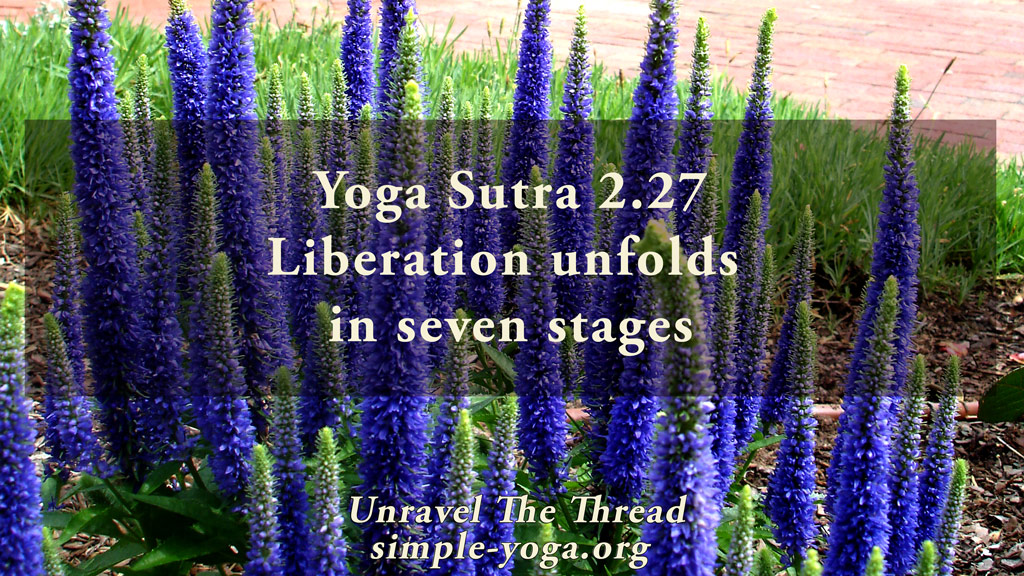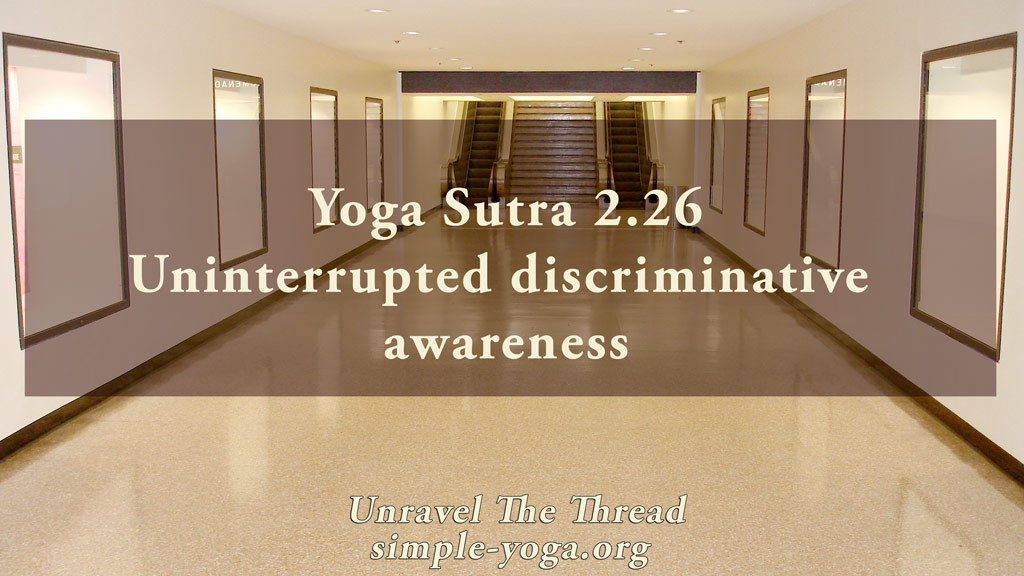
2.25 Freedom by removing confusion
August 7, 2020
2.27 Liberation unfolds in seven stages
August 23, 2020
2.25 Freedom by removing confusion
August 7, 2020
2.27 Liberation unfolds in seven stages
August 23, 20202.26 Uninterrupted discriminative awareness

2.26 The means to liberation is uninterrupted discriminative awareness (viveka khyati)
This sutra introduces the concept of discriminative awareness (viveka khyati). Discriminative awareness is noticing the fundamental difference between experience and awareness, or between being and doing. Without the ability to distinguish this difference, your ways of being will lead you to confusion, misidentification and suffering. Uninterrupted discriminative awareness, or being established in awareness, is the way to move towards liberation. As presented in 2.2, there are two basic options for living in the world: in stress (klesha) or in integration (samadhi). When you forget the fundamental truth about yourself, I AM, you tend to live in confusion (avidya) that causes stress and suffering. The other option is to be a discerning person living in awareness (2.15). This is what happens when you regulate the ways of being that generate misidentification, restrictions and limitations. By modulating your tendencies, you are effectively turning off the constant generation of opinions about what is happening, about others and about yourself. The person established in discriminative awareness recognizes the fundamental difference between living in harmony with the perfection of life on the one hand, and living in the stories in his head, on the other. Living in the perfection of life is another way of saying abiding in your true nature (1.3). The practice is simple: Every time you notice that you are attaching to some idea about who you think you are or should be, just drop it and return to just being. It is important to clarify that this is not a process of thinking or deduction. So, it is not thinking about being, it is just being. This is a gradual process.
For instance, when you are learning a new language, at first, any time someone speaks that language, all you hear is a sequence of unfamiliar sounds. The more you are exposed to the language, the more you start noticing brief pauses in speech that lead you to identify smaller units as words. Similarly, this process of orienting towards awareness means listening for the silence that underlies all mental processes, the formlessness in which all forms manifest and the stillness where all movements take place. It may be barely noticeable at first. But, through gentle persistence, it can grow gradually. It is important to clarify that this is not a call to inaction. Instead, it is an invitation to harmonize your being and your doing. So, even when you must engage in doing something, choose to do what you are doing without adding internal narration or commentary and without self-judging when you get distracted. In other words, be present in whatever you do, so that you do the best that you can (abhyasa), while remembering all along that your doings are temporary (vairagya). From this perspective, it might be easier to see all your activities, external and internal, as opportunities to know truly who you are. Can you develop the habit of aligning with the deep spaciousness, calmness and awareness underlying all of your thoughts, emotions and actions? Can this practice of dropping your identification with impermanent experiences become your new “normal” way of being? Can you set your intention to abide in awareness? Although it may take some time for you to be established in discriminative awareness all the time, do you notice a gradual progression in that direction?
As usual, one more way of exploring the meaning of this sutra is by chanting it.
You can choose to chant it in its traditional form with some of the words coming together:
2.26 vivekakhyātiraviplavā hānopāyaḥ
विवेकख्यातिरविप्लवा हानोपायः ॥२६॥
Another option is to chant each word in the sutra individually:
- viveka
- khyātiḥ
- aviplavā
- hāna
- upāyaḥ
If you prefer, you may listen to the podcast:
Unravel the thread is now available as a book!
If you find Simple-Yoga.org and Unravel the thread useful, consider supporting my labor with a donation, you may also donate using PayPal or Venmo. Thank you!
